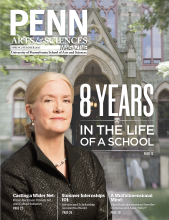Coming Back to Where You Started
Incoming Arts and Sciences Dean Steven Fluharty Reflects on his Path at Penn
SAS’s next dean has a long history with Penn and a unique perspective on the School: as an undergraduate, a graduate student, a dedicated teacher, and the parent of an undergraduate. Currently the University’s Senior Vice Provost for Research, Fluharty is also a professor of pharmacology, psychology, and neuroscience, and for 10 years he served as director of the School’s highly popular undergraduate Biological Basis of Behavior program. The incoming dean took a few moments with us to look back at his early years here and reflect on challenges to come.
Q: Your relationship with Penn officially started when you stepped onto campus as a freshman in the College of Arts and Sciences in 1974. What led you to choose Penn?
Fluharty: I had a pretty good sense of the campus as a destination from an early age. I’m originally from South Jersey, and the University was a hub of activity for me. My father had season tickets to the Philadelphia Eagles for years, and that was when they played at Franklin Field. In high school, a group of friends of mine were big Penn basketball fans, so we would go to games at the Palestra. Around that time I started to get more interested in Penn as an actual college destination, and in 1974, I arrived. And arguably, except for a four-year period that I spent doing postdoctoral work in Pittsburgh, I’ve never really left.
Q: By 1981 you had finished your Ph.D. here. How did all that happen so fast?
Fluharty: It started in the second semester of my freshman year when I convinced then-Provost Eliot Stellar to accept me into his advanced seminar course in physiological psychology. I never thought I would get in, but somehow I convinced him that I had some passion for the subject. Then I learned about the University Scholars program. That was a brand new program that allowed undergraduates with focused interests to construct a customized curriculum to accelerate their path to an advanced degree. By my junior year I was doing research in Alan’s Epstein’s lab—he was a former student of Eliot Stellar’s in our biology department. I started to take a mix of graduate and undergraduate courses in the psychology department. And before I got my undergraduate degree, I applied for a predoctoral fellowship from the National Institutes of Health for my research in Alan’s lab, and I got it. The fact that an undergraduate was able to get a research grant from a federal agency is testimony to how effective the University Scholars program was. But the short answer is that because my program was consolidated, I did three degrees in what amounts to less than seven years.
Q: Have you always been focused on science?
Fluharty: Actually, at first I was not focused at all. I came to Penn as an aspiring English major. I do not suggest that anyone go to admissions records and pull my application, but if you did, you would discover that I submitted a series of original poems that I thought captured the life experience from birth to death. I was an avid reader, an avid writer, and I really saw myself as an aspiring humanist who would write novels. I came here with that in mind. But then, as now, the College curriculum encouraged you to explore different things. In my first semester I took Intro to Psychology with Randy Gallistel—an incredibly talented professor who was interested in brain-behavior relationships. He was just phenomenal. That opened up a new direction and I never looked back.
Q: You served for many years as the director of the undergraduate Biological Basis of Behavior program. If the program had existed in the mid-1970s is it safe to say that would have been your major?
Fluharty: [BBB founding director] Norm Adler and I used to joke that in some respects I was arguably the first BBB major.
Q: What were your proudest accomplishments as BBB’s director?
Fluharty: I came into the BBB program as part of Penn’s professional school faculty—I had a primary appointment in Veterinary Medicine and Medicine. But I loved to teach undergraduates and I saw BBB as a phenomenal opportunity. When I was appointed director, I felt that was a bold move on the part of the School that demonstrated we had succeeded in creating a truly multidisciplinary program involving faculty from areas of expertise that enrich the undergraduate experience—regardless of where at Penn those faculty came from. As Director, I focused on strengthening the curriculum by involving more faculty from other schools. I was also a big advocate for promoting and providing undergraduate research opportunities for students interested in research—and for BBB, that was probably 60 percent of the class. And then at the end I got very interested in outreach activities.
Q: What are some of the big questions that have motivated you as a scientist?
Fluharty: At the broad level, I’ve always been interested in brain-behavior relationships. How do you go from the mechanics of the brain, the neural circuits, the release of neurotransmitters, to actually produce behavior? How is sensory information about the environment received and interpreted and then used to execute action? Those have been the big questions. More specifically, my main area of interest has been the interface between neuroendocrinology and behavioral neuroscience. I was interested in where and how peripheral signals—largely hormones that are generated and travel in the bloodstream—act in the brain. On the output side, I was interested primarily in what would be called the “ingestive behaviors” including feeding, thirst, and a phenomenon that’s somewhat unique to mammals, salt appetite—the act of seeking out of sources of salt, which is necessary to maintain circulation. I worked on all of those problems, but the principles were always the same: Identify the peripheral signals and then understand where and how they act in the brain to produce behavior.
"Whether it’s the energy crisis or political conflict, the reality is that, to understand the origins of today’s problems, to explore the range of solutions, and to understand the implications of implementing solutions, the broad perspective provided by the liberal arts is necessary." – Steven Fluharty
Q: How did your priorities change when you became Senior Vice Provost for Research?
Fluharty: I went through an interesting transformation. I recognized that I was deriving enormous professional and personal satisfaction from seeing Penn move collectively as a world-class research university; I didn’t feel any emptiness about having a less direct personal role in discovery. It was a kind of natural transition. What I found more difficult was walking away from an active teaching role—that was much harder than I thought it would be. At my last BBB class I felt like a retiring athlete. I was really choked up. To this day I miss active involvement in teaching, but I do find fulfillment in the opportunities I have to speak in other forums about what it means to be a great university.
Q: As Senior Vice Provost, you’ve been a vocal advocate for the role that research universities play in society and the importance of federal funding for research, particularly in the basic sciences. What do you see as your major challenges in taking on the role of advocating broadly for the liberal arts?
Fluharty: Whether it’s the energy crisis or political conflict, the reality is that, to understand the origins of today’s problems, to explore the range of solutions, and to understand the implications of implementing solutions, the broad perspective provided by the liberal arts is necessary. But there’s no question that in difficult economic times, people question the expense and the value of a broadly defined liberal arts education. The focus is on short-term gains: What can I measure in a year? What can I measure in a two-year period? The reality is that the impact of the undergraduate experience plays out over a long timeline. It can be a decade or more for the benefits of a liberal arts degree to be fully realized. But when you look at the analytics, you find that graduates of great universities like Penn, and the Penn undergraduate liberal arts experience, are having a huge impact on the world.




